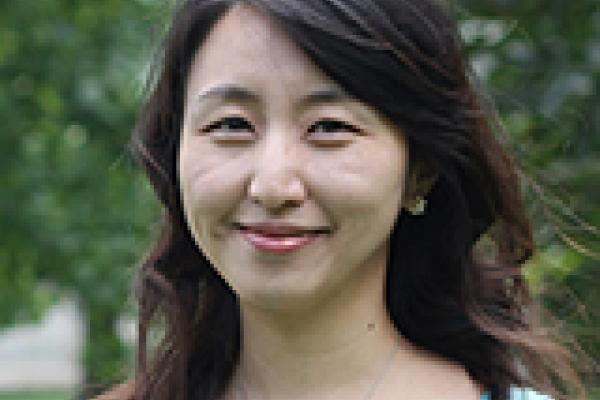Ching-Shan Chou wins an NSF Career Award

Ching-Shan Chou, assistant professor, mathematics, recently received the National Science Foundation’s NSF CAREER Award for her work in the area of mathematical biology. This is the top award NSF gives to outstanding junior faculty members whose work shows promise of significant ongoing contributions to their field.
Chou hopes to gain better understanding of basic cell-to-cell communication. Her winning proposal integrates her research plans with educational initiatives, and involves an undergraduate training program, a graduate working group, and mentoring PhD students.
Chou, who has been at Ohio State for four years, received her PhD in applied mathematics from Brown University. A computational mathematician, she became interested in mathematical biology during her postdoctoral work and “switched my focus to mathematical biology. Along the way, I’ve learned to mix the two together.”
In mixing the two together, Chou develops mathematical biological models and creates algorithms as an efficient way to analyze complex biological questions, such as cell-to-cell communication.
“Cell polarity is fundamental to cell physiology,” Chou said. “It underlies development and various other functions of a cell, and it can also lead to cell morphological changes, which are crucial for the vectored processes such as cell motility.”
The process of cell polarization and morphogenesis typically relies upon a complex signaling network, so researchers are making enormous efforts to identify regulatory molecules involved in the process.
Chou studies the establishment and maintenance of cell polarity using the model system, Saccharomyces cerevisiae, a budding yeast, whose cell cycles involve both mating and budding. This allows Chou to study cell polarity in both processes.
“While I’ve looked at cell physiology at different levels, this project focuses on the single-cell. I want to find out how it responds to both internal and external stimuli, which is a very complex process. I look at the cell both with shape changes and without and then see what comes into play as the cell changes shape.”
The cell changes shape when it wants to replicate itself. Chou wants to see how it communicates to make this happen.
“I apply computational tools, such as differential equations, at the cell interface, which simulates chemical reactions as well as shape changes. There are a lot of underlying biological questions important to answer and they have applications in many biological systems."
“Systems biology and modeling allow us to take what is known, see what does what, and figure out how the pathway works.”
Chou’s $410,000 grant not only helps fund her research project, but allows her to develop a new program for undergraduate students interested in biology. NSF CAREER Awards have a built-in outreach/educational component that provide support for researchers’ efforts to engage and build new generations of scientists.
“This program will consist of several stages,” Chou said. “First, students will be trained in computation and given enough tools to prepare them for eventual research. We will then proceed to paper-reading; I want them to read something that they don’t know about and try to extract the important messages. This will refine their ability to think critically and it will give them a sense of what is necessary to be able to do interdisciplinary work.
“What I really hope to do is train a new generation of mathematical biologists. But first, they need to learn how to become independent thinkers—it is kind of like a boot camp.
“Right now, I am in the process of recruiting eight to 10 juniors or seniors willing to join the program, which begins fall semester. It will be rather intense—that’s why I say ‘boot camp’— but it will be a unique opportunity for serious students. There is no other program like this on campus. Students will be expected to give presentations and they will spend a lot of time discussing what they have read. In the middle of the semester, I plan to invite cell biologists to give talks about their work. This is something that I am very, very excited about.”
